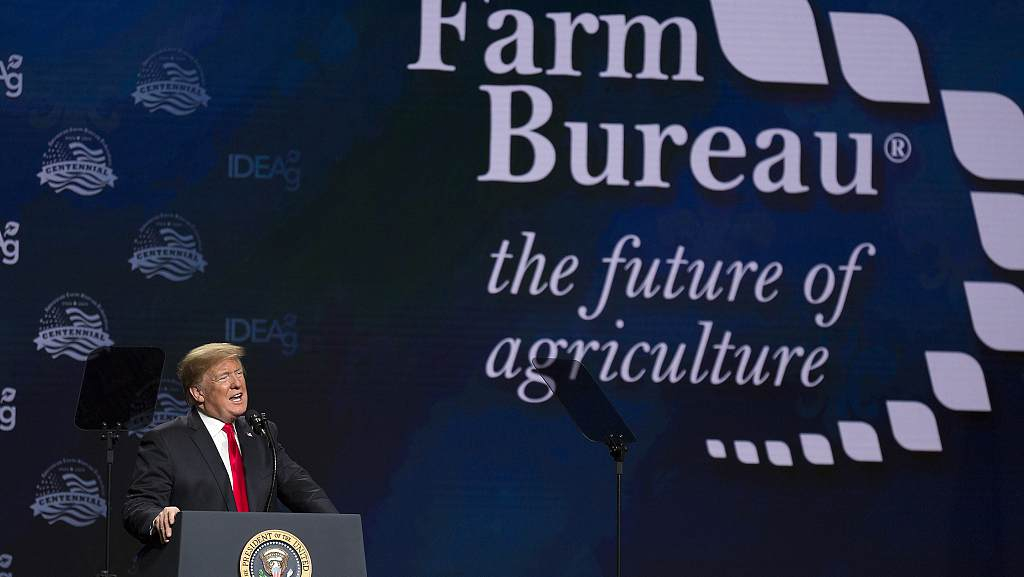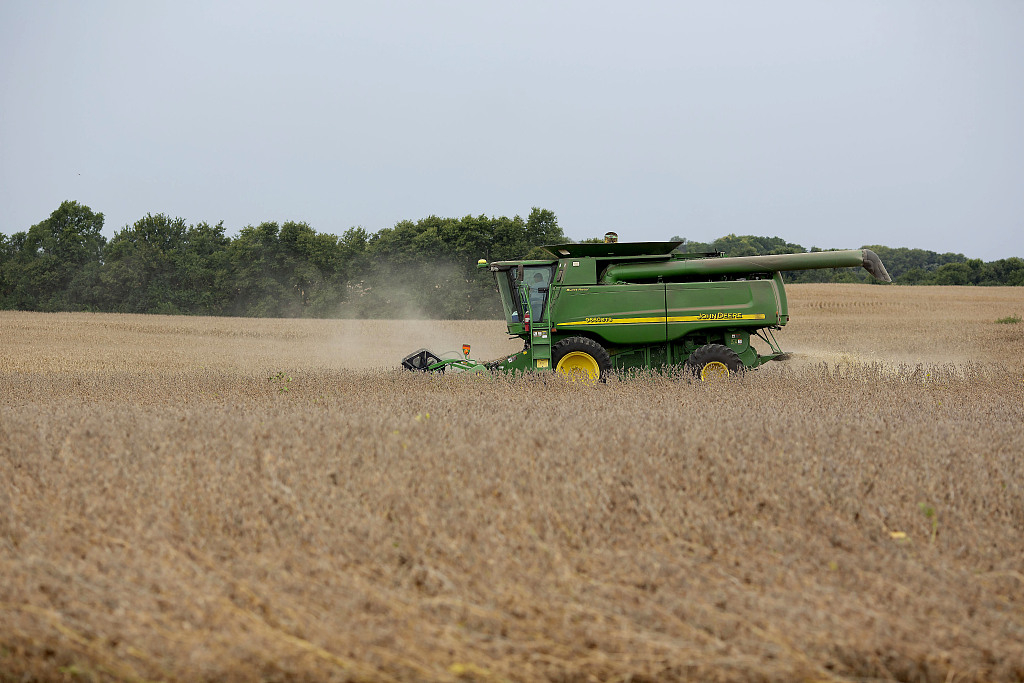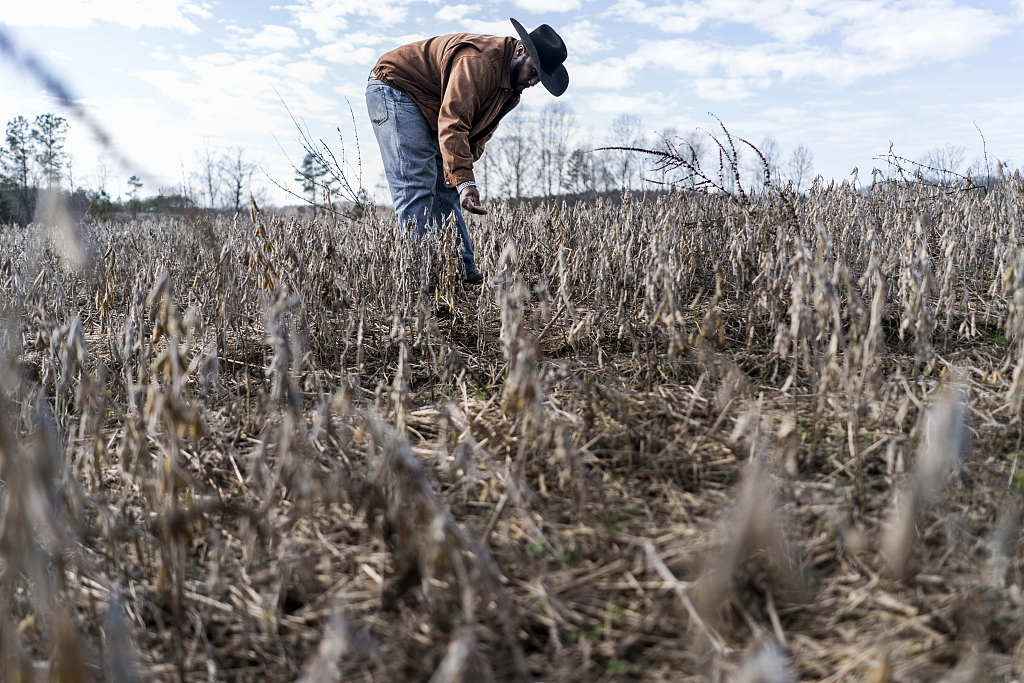
Opinion
12:14, 22-May-2019
Will Trump's political epitaph be 'I killed the American farmer'?
Updated
16:13, 22-May-2019
Andy Mok

Editor's Note: Andy Mok is a research fellow at Center for China and Globalization. The article reflects the author's opinion, and not necessarily the views of CGTN.
Since its founding in 1776 to the days of Norman Rockwell and even today, nothing better captures the quintessential spirit of America than its agrarian way of life. And this is why Trump's trade war is so troubling. It is not only financially but literally killing American farmers.
According to former U.S. Senator (D-North Dakota) Heidi Heitkamp in a speech last year, “When you're from a farming community, you understand the stresses that many farmers face every day. But outside rural America, so many aren't aware of how difficult it is to work as a farmer. We need to support farmers who feed our country and the world."
But President Trump seems hellbent on doing the exact opposite and appears set on not only ruining American farmers but obliterating an essential part of the American way of life.
As Heitkamp notes, farming has never been easy. But in the U.S., it has become especially challenging. Between 2013 and 2017, net farm income for U.S. farmers has declined 50 percent. Moreover, farming is uniquely stressful because of the numerous factors beyond a farmer's control including weather, access to and the price of capital and market-driven gyrating crop prices.
However, one thing American farmers could count on was the China market. According to the Minnesota Department of Agriculture from 2000 to 2017, U.S. agricultural exports to China increased by 700 percent, reaching 23.8 billion U.S. dollars in 2017, which made China the largest export market for the American agricultural sector. And the benefits for American farmers were widespread with soybeans, alfalfa, hay, dairy, poultry, pork, beef and even wheat being among the top five export markets.

Soybeans are harvested with a Deere & Co. combine harvester in Wyanet, Illinois, U.S., September 18, 2018. /VCG Photo
Soybeans are harvested with a Deere & Co. combine harvester in Wyanet, Illinois, U.S., September 18, 2018. /VCG Photo
But this island of economic security has been blasted apart by Trump's disastrous trade war. Not only have American farm exports to China cratered but prices have also fallen with soybean prices at their lowest since 2008.
According to Minnesota farmer and vice president of the American Soybean Association, Bill Gordon, in a recent Rolling Stone interview, said, "Soybean farmers have sunk their own money, blood, sweat and tears for the last 40 years into building the Chinese market up and getting trade partners and building this two-way relationship, then it gets taken away overnight.”

On day 19 of the partial government shutdown, fourth-generation crop farmer John Boyd, and president of the Black Farmer's Association, checks the condition of a soybean field for harvesting in Baskerville, Virginia, January 8, 2019. /VCG Photo
On day 19 of the partial government shutdown, fourth-generation crop farmer John Boyd, and president of the Black Farmer's Association, checks the condition of a soybean field for harvesting in Baskerville, Virginia, January 8, 2019. /VCG Photo
What is especially unfortunate is that the U.S.'s agricultural sector is one of the few to consistently enjoy a trade surplus with China. And given the U.S.'s natural resource endowments this structural advantage would be an enduring one providing a stable and growing source of prosperity for American farmers as China's middle class rapidly expands and seeks a greater variety of high-quality consumption choices.
Instead, President Trump has heedlessly sacrificed the livelihoods and even the lives of American farmers while wrecking one of the most important competitive advantages the U.S. possesses.
While some farmers continue to voice support for Trump, many more are expressing remorse and even outrage at his incomprehension over their plight.
Bailouts have been promised. But for many farmers, this is viewed as an insult as they seek “trade, not aid.” Also, evidence has shown that these bailouts, at best, only partially compensate farmers for the double-whammy of lost sales and lower prices.
The 2020 presidential election will likely be decided by a handful of states and these happen to be ones where agriculture is the backbone of the economy and the dominant way of life.
According to Trump, trade wars are easy to win. But the political costs may be greater than expected. And sadly, Trump's political epitaph may be, “I killed the American farmer.”
(If you want to contribute and have specific expertise, please contact us at opinions@cgtn.com.)

SITEMAP
Copyright © 2018 CGTN. Beijing ICP prepared NO.16065310-3
Copyright © 2018 CGTN. Beijing ICP prepared NO.16065310-3